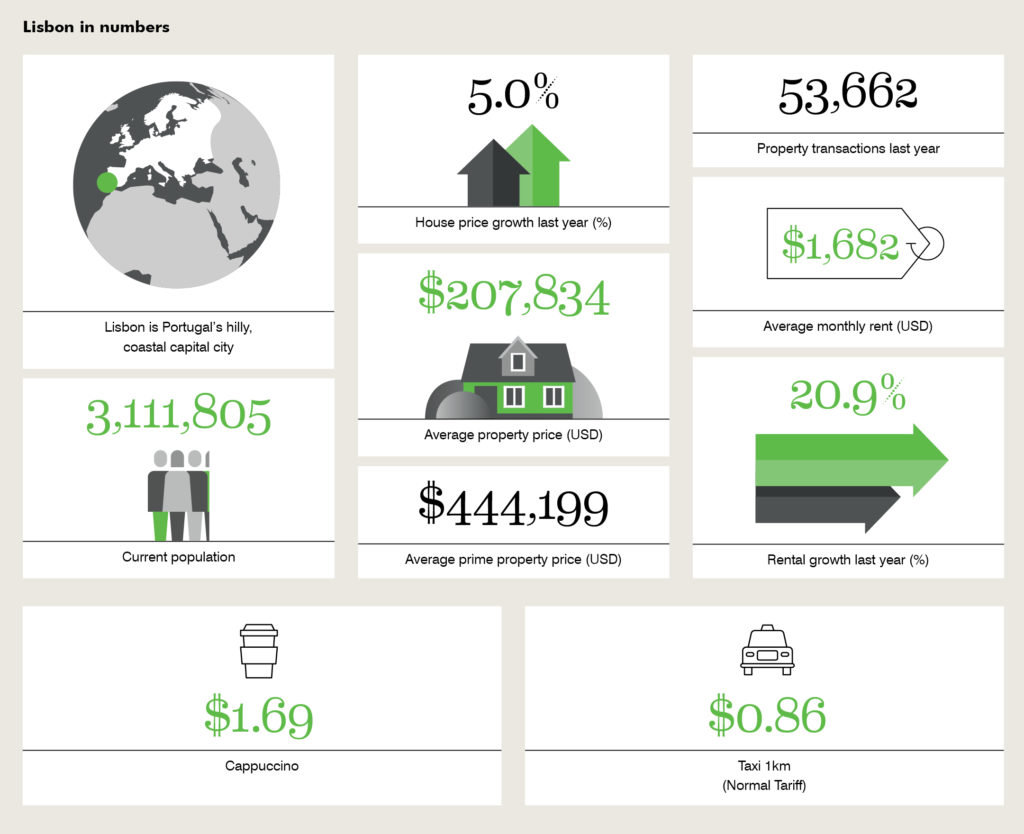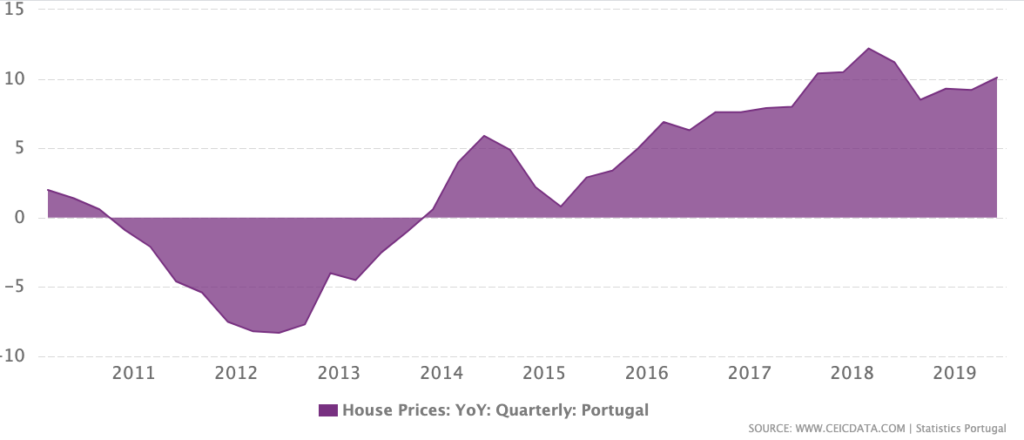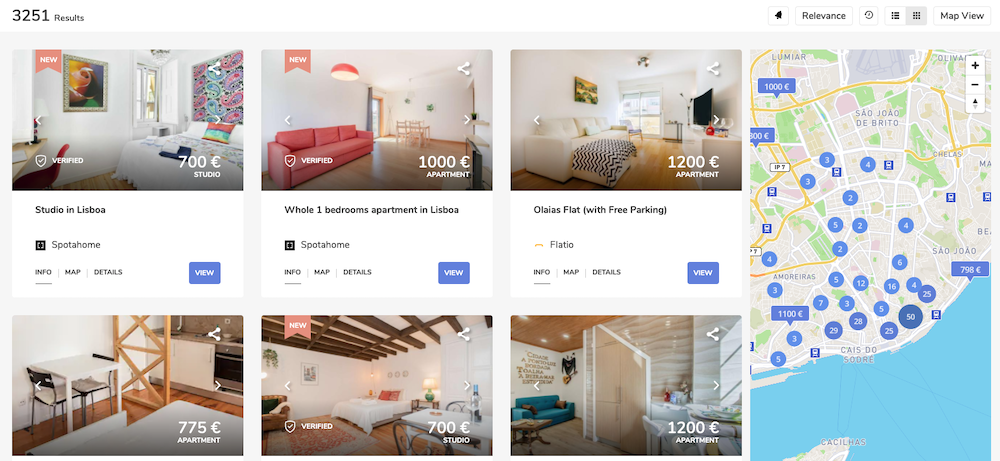Is moving to Lisbon worth it? Portugal offers many benefits that encourage people to move here, and one of the biggest motivators is the alleged low cost of living and affordable real estate. But how affordable is it really? Let’s take a look at the residential renting and buying situation in Lisbon city and the greater Lisbon area, and the economic effects of Covid-19 on Lisbon’s housing market.

Prior to the pandemic: Renting in Lisbon
Being the capital city, it makes sense that Lisbon’s housing prices are among the highest compared to the rest of Portugal, not just for buying but also for renting. Prior to Covid-19, it was almost impossible to find a decent one-bedroom (called a T1) apartment in the city or even in the surrounding Lisbon city area such as Alges for less than 800 euros per month rent.
Most of these come without the basics:
• no lift in the building
• no parking spot
• no heating or air conditioning
Bear in mind that monthly net salaries are around 1,000 euros on average, meaning that it was impossible to have any disposable income. Most people working and living in Lisbon live paycheck to paycheck due to high rental prices, unable to save much.
Given that reality, it is common to share apartments with flatmates, because it is cheaper to rent just one room. However, the monthly rent for one room in the city near public transportation (and even in Greater Lisbon) was also quite high prior to Covid-19, the average being around 450 euros for a basic room. Many landlords would rent only from September to May, asking tenants to leave during the summer months so that they could put the rooms up on Airbnb for short-term rentals, targeting tourists who can afford to pay more than the residents of Lisbon.
After Covid-19: Renting in Lisbon
The rental situation post-Covid (or amid Covid as we are still experiencing the pandemic here) in Lisbon has definitely been impacted, but not in a very definitive manner.
Some landlords saw a huge drop in the number of airbnb bookings, and decided to put up their rooms for rent for long-term, asking for a monthly rent that was about the same as before Covid-19 (around 450 euros per month for a basic room).
Others saw their international student and expat tenants moving out to go back home without much notice and needed new tenants urgently, despite the moratorium, and are offering lower rental prices. Similarly, tenants who rented out a whole apartment on their own also needed to find flatmates to replace those who left Portugal, and are also offering below market prices to ensure they find someone fast.
It is safe to say that Covid-19 had an impact on the rental market but the decrease in rental fees was not a generalised occurrence and rather differed on a case-by-case basis. As before the pandemic, the best way to find affordable and decent accommodation in Lisbon is by searching diligently every day and contacting the relevant person ASAP even though currently there is definitely more supply than demand.

Prior to the pandemic: buying in Lisbon
Buying property in Lisbon prior to the pandemic was an unreachable goal for many middle-class working professionals in Lisbon. Most people preferred to go to the outskirts (Setubal, Oeiras) to find more affordable options.
Prices everywhere had been increasing prior to covid, and according to
Global Property Guide, property prices in the Lisbon metropolitan area have gone up by 9.5 percent in November 2019 compared to a year before, with an average of 1,631 euros ($1,816) per square meter.
In the Greater Lisbon area, the increases were: Amadora (14.8 percent), Almada (11.2 percent), Odivelas(10.5 percent), Seixal (10.4 percent), Setúbal (7.8 percent), and Oeiras(6.3 percent).
Demand was high, and sellers took advantage of it. Prices were expected to increase in 2020. However, despite these expected increases, Lisbon still remained one of the most affordable cities for foreigners in terms of purchasing property, and this has greatly helped to boost Portugal’s economy, while unfortunately, existing residents suffered.
After Covid-19: buying in Lisbon
According to Cushman & Wakefield, a real estate consultancy firm, demand from foreigners will increase again post-pandemic, and international investors will still see Portugal as a prime location for investing in property.
In fact, banks predict a relatively small impact on the real estate market. But taking into account that Covid-19 imposed social distancing and travel (and therefore immigration) restrictions, some residences are not selling as fast or as well as was expected.
According to Standard & Poor’s statistics, housing prices in Portugal were expected to fall by 2.5 percent in 2020 due to Covid-19, then recover quickly and grow by the end of 2022. However, real estate companies in Portugal such as Imovirtual have reported that up till now, property prices have increased by 12 percent. And according to data from June 2020 from Idealista, the Lisbon metro area saw the biggest increase (11 percent) compared to the previous year. That being said, once in a while you can still find below market prices from owners who are in a hurry to sell for personal financial reasons.
All things considered, Lisbon is still an affordable city in terms of property, but mostly for foreigners and investors – still out of reach for locals and expats working here. The pandemic is still not over in Portugal, with an average of 300 new cases per day, and with the summer season being a huge opportunity for the tourism economy, the government is not keen on imposing another lockdown.
With that in mind, the housing market might change in the near future.

About the author:
A graduate of Claremont Graduate University in Claremont, Calif., Liina Edun has a background in psychology and a career in writing and content management.
Having lived most of her life as an expat, she is currently located in Lisbon.
See more on Dispatches here about Portugal.
See our Lisbon archive here.














